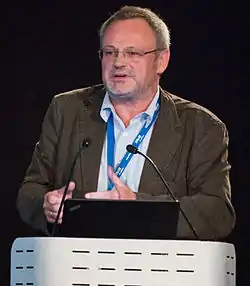Jürgen Handke | |
|---|---|
 Jürgen Handke talking about digital, interactive and innovative teaching methods at St Pölten University, Austria | |
| Born | 13 April 1954 Hannover, Germany |
| Nationality | German |
| Alma mater | Leibniz University Hannover University of Reading |
| Awards | Hessian Teaching and Learning Award for the Inverted Classroom Mastery Model (2013), Ars Legendi Prize for Digital Teaching and Learning (2015) |
| Scientific career | |
| Fields | Linguistics |
Jürgen Handke (born 13 April 1954) is a German professor of English linguistics.
Life
Handke originally studied English, sports, and philosophy to become a teacher at Universität Hannover from 1975 to 1980 and did his postgraduate in linguistics at the University of Reading from 1981 to 1983.
He was a research assistant in Hannover from 1981 to 1984. In 1984, Handke did his Ph.D, writing his dissertation on adverbial clauses in English.
From 1984 to 1991 Handke was a research assistant at Universität Wuppertal, where he wrote his habilitation dissertation Natural Language Processing and Implementation in LISP under the supervision of Gisa Rauh in 1990.
Since 1991, Handke has been working as a professor of English at Philipps-Universität Marburg. His focus is on linguistics and e-learning.
Additionally, Handke is an advisor to several German state governments and a member of the national board "Hochschulforum Digitalisierung".
Virtual Linguistics Campus
Handke began to use digital and interactive teaching methods in the form of CD-ROMs in the early 1990s. This method of teaching resulted in the creation of the world's first and largest e-learning platform for linguistics, the Virtual Linguistics Campus (VLC).[1]
The VLC offers a wide variety of courses on linguistics, ranging from introductory to more advanced material.
In 2017, Handke started integrating humanoid robots into his in-class scenarios as part of the project.[2]
Music
Alongside his academic work, Handke is also a musician and has been playing music since his early teenage years. In the 1970s, he played with Matthias Jabs (later Scorpions) and Hannes Folberth (later Eloy) amongst others in a band called Deadlock.[3] The band split in 1977 because Handke decided to solely focus on linguistics and went to England.
Selected publications
- Handke, Jürgen (2000). The Mouton Interactive Introduction to Phonetics and Phonology. Berlin: Mouton de Gruyter. ISBN 3-11-016812-X. OCLC 46724656.[4][5]
- Handke, Jürgen (2000). Die interaktive Einführung in die Linguistik 2.0 ein interaktiver Kurs für Studierende der Sprachwissenschaften (in German). Ismaning: Hüber. ISBN 3-19-001653-4. OCLC 76104721.[6][7]
References
- ↑ "The Virtual Linguistics Campus". University of Marburg. Retrieved 11 September 2020.
- ↑ "Project H.E.A.R.T." (in German). University of Marburg. Retrieved 11 September 2020.
- ↑ Jethro Tull Music by JH, staff website of Jürgen Handke hosted by Philipps-Universität Marburg, accessed 25 August 2012.
- ↑ Gordon, Matthew (2002). "Review of The Mouton Interactive Introduction to Phonetics and Phonology". Phonology. 19 (1): 121–124. doi:10.1017/S0952675702214293. ISSN 0952-6757. JSTOR 4420217. S2CID 56779592.
- ↑ Appel, Heinz-Wilfried (2005). "Review of The Mouton Interactive Introduction to Phonetics and Phonology". Zeitschrift für Dialektologie und Linguistik. 72 (2): 203–204. ISSN 0044-1449. JSTOR 40505284.
- ↑ Ecke, Peter (2001). Handke, Jürgen; Intemann, Frauke (eds.). "Software Review". Die Unterrichtspraxis / Teaching German. 34 (2): 191–192. doi:10.2307/3531380. ISSN 0042-062X. JSTOR 3531380.
- ↑ Schmitt, Cristina (September 2002). "Review of The Interactive Introduction to Linguistics". Studies in Second Language Acquisition. 24 (3): 489–490. doi:10.1017/S0272263102213066. ISSN 1470-1545. S2CID 145241967.
External links
- Literature by and about Jürgen Handke in the German National Library catalogue